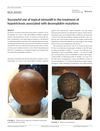2 citations,
May 2023 in “Biology” New mouse models of Pemphigus show severe symptoms and need better treatments.
2 citations,
March 2018 in “ACS Sustainable Chemistry & Engineering” Heating human hair creates hollow microtubes with smooth surfaces.
 2 citations,
March 2013 in “Hair transplant forum international”
2 citations,
March 2013 in “Hair transplant forum international” Research on "hair cloning" for hair loss shows potential for hair thickening but has not yet achieved new hair growth in humans.
 2 citations,
January 2009 in “Journal of Drug Delivery Science and Technology”
2 citations,
January 2009 in “Journal of Drug Delivery Science and Technology” Minoxidil in distearyldimethylammonium chloride vesicles significantly promotes hair growth, while minoxidil in microparticles or poloxamer solutions doesn't.
 1 citations,
January 2015 in “Advanced techniques in biology & medicine”
1 citations,
January 2015 in “Advanced techniques in biology & medicine” Down Syndrome patients with Alopecia Areata often have hypothyroidism and specific immune abnormalities.
 1 citations,
November 2023 in “iScience”
1 citations,
November 2023 in “iScience” A protein called desmoglein 3 is important for keeping hair follicle stem cells inactive and helps in their regeneration.
 1 citations,
January 2018 in “Elsevier eBooks”
1 citations,
January 2018 in “Elsevier eBooks” The skin's dermal layer contains true stem cells with diverse functions and interactions that need more research to fully understand.
 1 citations,
February 2013 in “InTech eBooks”
1 citations,
February 2013 in “InTech eBooks” Genetic mutations cause various hair diseases, and whole genome sequencing may reveal more about these conditions.
 1 citations,
April 2024 in “Skin research and technology”
1 citations,
April 2024 in “Skin research and technology” Topical rosuvastatin and melatonin creams significantly reduce psoriasis severity and are safe.
1 citations,
December 2023 in “Nanomaterials” Combining specific nanoparticles with immune therapy significantly improves cancer treatment.
1 citations,
July 2021 in “Health & Medical Journal” Men with systemic lupus erythematosus often have more severe symptoms but can respond well to treatment.
1 citations,
September 2019 in “Journal of Investigative Dermatology” Anti-Desmocollin 3 antibodies can cause pemphigus-like symptoms in mice.
 1 citations,
August 2019 in “Pediatric dermatology”
1 citations,
August 2019 in “Pediatric dermatology” Topical minoxidil helped an 8-year-old boy with a genetic hair disorder grow hair.
 1 citations,
May 2018 in “Clinical chemistry”
1 citations,
May 2018 in “Clinical chemistry” The girl's unexpected pubic hair growth led to a diagnosis different from complete androgen insensitivity syndrome.
 1 citations,
January 2014 in “Progress in Neurology and Psychiatry”
1 citations,
January 2014 in “Progress in Neurology and Psychiatry” Skin diseases can cause psychological issues, and better integration of dermatology and psychiatry is needed to improve patient care.
1 citations,
October 2013 in “The American Journal of Gastroenterology” Infliximab can trigger lupus-like symptoms in Crohn's disease patients.
 April 2023 in “The journal of investigative dermatology/Journal of investigative dermatology”
April 2023 in “The journal of investigative dermatology/Journal of investigative dermatology” Aging changes female scalp cells, likely affecting hair health.
 April 2021 in “Journal of Investigative Dermatology”
April 2021 in “Journal of Investigative Dermatology” The research found genes that may protect certain scalp cells from hair loss.
 January 2021 in “Faculty Opinions – Post-Publication Peer Review of the Biomedical Literature”
January 2021 in “Faculty Opinions – Post-Publication Peer Review of the Biomedical Literature” Aging affects the cells around hair follicles, which may influence female pattern hair loss and treatment options.
 April 2017 in “Journal of Investigative Dermatology”
April 2017 in “Journal of Investigative Dermatology” The hair follicle dermal sheath is essential for hair shedding and needs to communicate with the outer root sheath for normal hair growth cycles.
 March 2024 in “Poster presentations”
March 2024 in “Poster presentations” A woman with lupus and Kikuchi-Fujimoto disease improved with treatment.
 November 2023 in “International Journal of Medical Sciences”
November 2023 in “International Journal of Medical Sciences” New regenerative medicine-based therapies for hair loss look promising but need more clinical validation.
 November 2023 in “Journal of Dermatological Science”
November 2023 in “Journal of Dermatological Science” Cells that move well may improve hair loss treatments by entering hair follicles.
 February 2025 in “Journal of Clinical Investigation”
February 2025 in “Journal of Clinical Investigation” RNase L hinders hair growth by altering immune signals.
December 2024 in “International Journal of Molecular Sciences” Targeting CXCL12 may help treat hair loss caused by androgens.
October 2024 in “Cosmetics” ATG effectively reduces hair frizz without damaging hair strength.
 April 2024 in “Research Square (Research Square)”
April 2024 in “Research Square (Research Square)” 16-MHA can restore the barrier and moisture of damaged hair, making it similar to undamaged hair.

Genetic testing can help diagnose skin conditions but needs more research for full effectiveness.
 January 2024 in “International Journal of Cosmetic Science”
January 2024 in “International Journal of Cosmetic Science” A new method using 1,4-n-butylene dimaleate effectively repairs and strengthens damaged hair.
 August 2023 in “Acta Scientific Paediatrics”
August 2023 in “Acta Scientific Paediatrics” A baby from an Indian family had a rare genetic disorder causing no scalp or body hair due to a specific gene deletion.





















